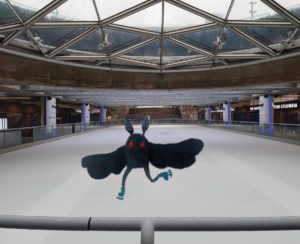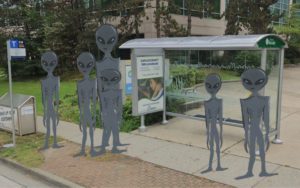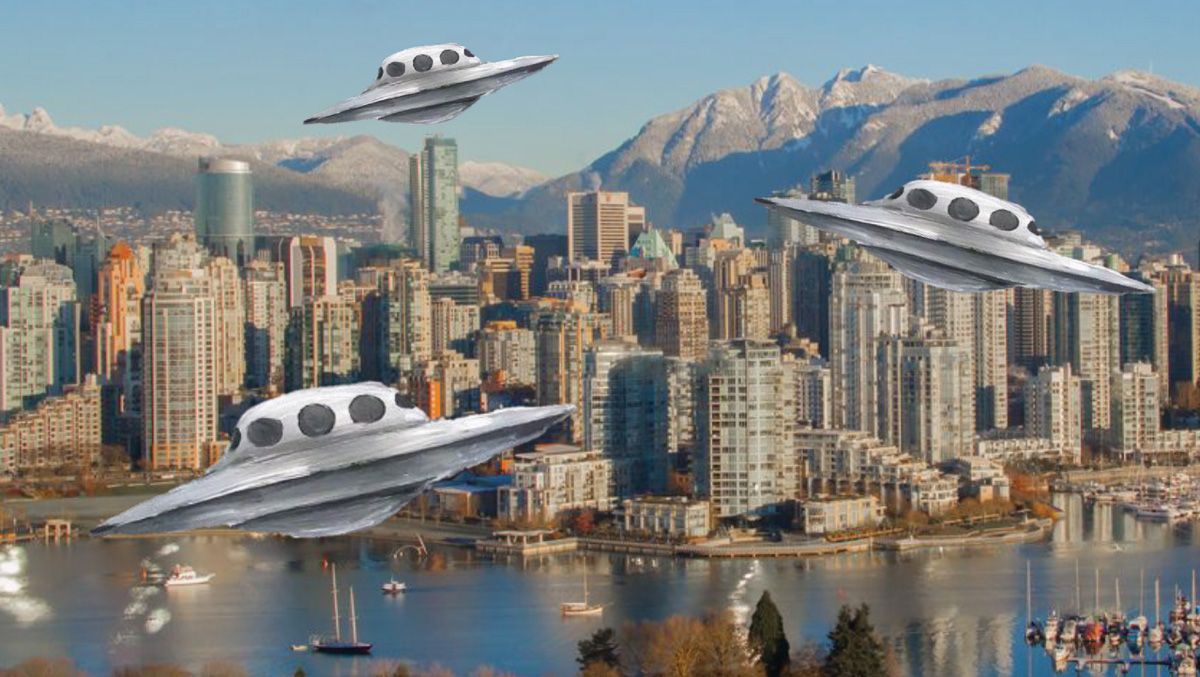The last time I was downtown pre-pandemic was February 11, 2020. I was in Vancouver for a concert at the Imperial in Chinatown. There were a couple celebrity sightings, I tried a new and terrible cider, and then I took the train and a bus home to White Rock, where I’ve been stuck ever since.
Watching The X-Files during lockdown doesn’t remind me of the city I’m missing — spending my pandemic in the suburbs — watching The X-Files reminds me of the city of my teen years, the city of concerts and vintage shops, the city where I thought I’d be an adult. By the time I was ready to leave Surrey and cross the river alone, that Vancouver was out of my reach. That Vancouver has been gone for a long time.
It lives on in the first season of The X-Files. The first season is cold, dark, and rainy. So rainy. The first season travels across the United States, but never leaves the Lower Mainland. The first season is a memory and a looking glass. I was 12 when the first season aired, and I was looking for myself. It was exciting to see ourselves on screen. But being seen means losing part of who you are.
That Vancouver where I dreamed of living when I was a teenager doesn’t exist anymore. But we can revisit it through The X-Files. We can go back in time. Before hyper-development. Before climate change. Before everywhere on TV looked like Vancouver.
There are no glass condos in the Vancouver of The X-Files. Whether they’re on a case in Idaho, in Washington, or at home in DC, they find the best examples of Victorian architecture. British Columbia’s namesake colonial roots are all throughout the first season. Stained glass in every window, lit up for colour in the background.

On TV, Vancouver is big cities and small towns at the same time because, of course, Vancouver isn’t only Vancouver. It’s Burnaby and Richmond, Surrey and Delta. All of the Lower Mainland shows up in The X-Files, the whole sprawling metropolis. In the episode, Miracle Man, Steveston plays Tennessee. In Gender Bender, Steveston plays Massachusetts. For a kid who grew up in a boring suburb, I wanted Vancouver to be all those places, too. I needed to know there was a place where I could escape.
My first episode was Darkness Falls. A very Pacific Northwest episode, where you’re supposed to think the bad guy is the environmentalist. Mulder and Scully venture high up in the wooded mountains, where a team of loggers have gone missing. The environmentalists—now eco-terrorists—are the first to be blamed. But it’s the loggers who have been cutting down the old growth trees they’re not supposed to. Out of the rings of those ancient trees come swarms of tiny green bugs. Like anything in hibernation for hundreds of years, those tiny green bugs are hungry.
I was 13 when that episode aired in 1994, and Clayoquot Sound was still in the news. The protests against the clearcutting by MacMillan Bloedel, sanctioned by the BC government, had come to a head the year before, with arrests and constant news coverage. I was a recycling environmentalist then, who was worried about the ozone layer. Clayoquot radicalised my 12 year old mind and made me a socialist.
The trees of Vancouver are the very first thing we see in the pilot episode. A woman runs through the woods in her nightgown. She falls in the dirt and fallen leaves. Wind blows the cedar branches and her hair in her face. A light gets brighter and brighter, though it’s night time. A man comes through the trees. At least, we think it’s a man. This first episode starts in Oregon. BC can play Oregon, easily. BC can play Washington, even northern California. In 2012, I drove with two friends north from LA, up the coast, and home to Surrey, and what struck me most was how quickly the landscape became recognisable. It doesn’t take long beyond the desert before you see trees like home. The west coast is the west coast all the way.
In Eve, Vancouver plays two sides of the continent. First, a man dies in Connecticut. Then later—but in fact, at the exact same time—a man in California. We can play any suburb because our streets are still lined with trees. Unlike our forests, which are primarily firs and cedars, the streets were planted with leafy trees that could be anywhere. Connecticut, I’ve never seen in person, though I spent a year on the east coast, in Halifax. The trees are different there. Their leaves turn brilliant autumn colours which outshine the west coast. Before I saw autumn in person, I scoffed at leaf peeping. Now I understand the spectacle.
But when I stood at the top of Citadel Hill, I didn’t see any mountains. Without the embrace of the mountains, I worried we’d slide off into the ocean. We’re known in BC for those mountains, for the cold, the water. Buntzen Lake stars in Conduit as a lake in Iowa. It’s a lake I know well. Years of hikes with Girl Guides and my family, walking circles around that lake. I knew it from the first scene of the show. I knew its name, the same way I know the mountains by the shape of their peaks.
When I returned to the Lower Mainland, after a year on the east coast, all I could see were the mountains. They were bigger than ever, and closer, I’d swear. They were right there in my face, like they knew I’d been missing them.
And then they faded back, like the rest of the city of my youth. I came back to Vancouver on the other side of 30, and I didn’t need to be here to prove myself anymore. I was ready to move on.
When I was 13, the city across the river was the place I wanted to be. When I see it now, through the lens of The X-Files season one, in the middle of a pandemic that’s kept me stuck in the suburbs, the city doesn’t seem like much. I don’t miss it like I once did, when I yearned to live downtown as a teenager. I don’t want the busy streets, the crowds, the towers blocking my view of the horizon. Vancouver was the city of my teenage dreams, and like those dreams, the city is gone. Now it’s just a city without an identity. It’s a city that plays everywhere on film and tv. It wants to be the green city, but hikes the transit fares, ignores the suburbs, prosecutes climate activists. It’s a city full of empty houses, rising high above tent camps. I don’t miss the pre-pandemic Vancouver.

The show moved to LA in season six, leaving behind the rain and the mountains. David Duchovny left in season 8, and I lost track of new episodes not long afterwards. I was in my 20s then, and instead of Vancouver, I had chosen Victoria for university. I lost track of the city Vancouver used to be. Coming back to the show during a pandemic means coming back to the teenager I once was, the one who dreamed of living downtown, of being a writer, of telling fantastical stories. It means coming back to those dreams and picking them up once again.
David Duchovny and Gillian Anderson came back to The X-Files in 2016, and the show returned to film in BC. Instead of Vancouver rain, the show starts with wide open skies on a hilly tundra in Ashcroft. Instead of running down dark alleys, Mulder and Scully meet on a busy, sunny downtown street, one of those tall glass towers behind them. They’re older now, and so am I.
I didn’t watch the reboot when it first aired. I decided to leave my love in the past. Though I had stopped watching the show in the later seasons, I had returned for the final episode. But it wasn’t my show anymore. The final episode was filmed in LA, and I didn’t recognise any of the streets.
Gillian Anderson has announced she won’t return, schedules and all. Her career has grown beyond Dana Scully. My life has grown beyond Vancouver. I live in White Rock, as far as the suburbs stretch, while still being part of the lower mainland. I live next to the beach, at the top of the rock, far past the end of the Skytrain line.
We can’t have the old X-Files back for the same reason we can’t have the old Vancouver. Those years are gone. I’m not the same kid who read every book in the paranormal section of the library stacks. I’m 40 now, a milestone birthday I celebrated in lockdown. Where I spent 30 on the other side of the country, I spent 40 in the suburbs, stuck, but at a kind of peace. I don’t need the rush of downtown like I once thought I did. There are cities all over the province I haven’t seen, not even on TV.
This pandemic can’t last forever, and there are so many more seasons of The X-Files I haven’t watched. It’s been nice to visit. The trees look so green in the rain.


